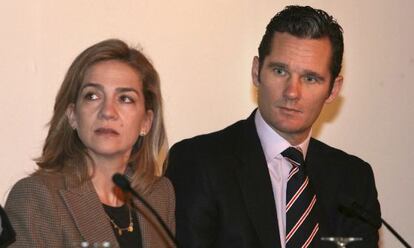King lent Princess Cristina €1.2m to renovate Barcelona mansion
Transfer shows up in analysis of accounts ordered by judge investigating Urdangarin scandal

The name of King Juan Carlos is among those that appear in the summary of the Nóos corruption case as a result of a loan he made to his daughter Princess Cristina and her husband, Iñaki Urdangarin, in 2004.
According to an analysis of the Duke and Duchess of Palma’s finances — which was ordered by Nóos investigating Judge José Castro, and carried out by the Spanish tax office — the king transferred 1.2 million euros from his personal account to that of his daughter, which she declared as a loan until 2010.
Royal Household sources say the loan was made in two payments of 600,000 euros in order to renovate the mansion the couple acquired in the Pedralbes neighborhood of Barcelona in 2004. Public and tax agency records exist for both transfers, it has insisted.
The aim of the judicial analysis of the princess’s financial movements between 2002 and 2012 is to determine if there is evidence she committed money laundering offenses.
The Royal Household says that
The king’s youngest daughter has gradually found herself drawn into the fraud investigation involving her husband, who, along with his business partner Diego Torres, is suspected of siphoning off millions in public funds to private companies via his non-profit Nóos Institute by over-invoicing for sports and tourism events in the Balearic and Valencia regions. Cristina was listed as a spokesperson, board member and advisor at the Nóos Institute.
The princess was named as an official suspect in the probe back in April, but the provincial High Court of Mallorca later decided to remove her from the list. At the beginning of August Judge Castro widened the scope of his investigation into the princess’s possible involvement in money laundering and tax offenses relating to her husband’s suspicious business activities in order to determine whether she should once again be cited as an official suspect in the case.

Castro asked the tax agency to track all operations that Princess Cristina made with third parties, especially those relating to the renovation work on the Pedralbes mansion, which the couple bought for six million euros in 2004.
In another development in the inquiry on Monday, the Anticorruption Public Prosecutor called on the regional High Court of Valencia (TSJCV) to investigate and indict the mayor of Valencia, Mayor Rita Barberá, and former Valencia regional premier Francisco Camps for their involvement in the Nóos case. The public prosecutor also requested that the entire Nóos investigation — not just the part involving the two local Popular Party politicians — be transferred for judgment in the Valencia region’s courts.
The public prosecutor has detected evidence of criminal activity in the signing of contracts relating to the Valencia Summit by the two leaders and Urdangarin between 2004 and 2006.
“Taking into account the evident connection between the alleged criminal acts carried out in the Valencia region and the Balearic region, and the unfeasibility of trying them separately, the regional High Court of Valencia should take on the investigation as a whole,” the statement read.
The public prosecutor presented its statement after the TSJCV poured scorn on its request to extend the deadline for it and other parties in the case to pronounce on the matter.
In May, Judge Castro sent a detailed statement to the TSJCV outlining the evidence relating to Camps’ and Barberá’s involvement in negotiations prior to the signing of agreements for the Valencia Summit and the never-held European Games, for which Nóos received around three million euros of public funds.
Castro also proposed that the court take on responsibility for investigating this part of the case, given that their parliamentary immunity meant both Camps and Barberá could only be tried there.
The Valencia Socialist Party has already accused both leaders of five criminal charges relating to the signing of the agreements.
Tu suscripción se está usando en otro dispositivo
¿Quieres añadir otro usuario a tu suscripción?
Si continúas leyendo en este dispositivo, no se podrá leer en el otro.
FlechaTu suscripción se está usando en otro dispositivo y solo puedes acceder a EL PAÍS desde un dispositivo a la vez.
Si quieres compartir tu cuenta, cambia tu suscripción a la modalidad Premium, así podrás añadir otro usuario. Cada uno accederá con su propia cuenta de email, lo que os permitirá personalizar vuestra experiencia en EL PAÍS.
¿Tienes una suscripción de empresa? Accede aquí para contratar más cuentas.
En el caso de no saber quién está usando tu cuenta, te recomendamos cambiar tu contraseña aquí.
Si decides continuar compartiendo tu cuenta, este mensaje se mostrará en tu dispositivo y en el de la otra persona que está usando tu cuenta de forma indefinida, afectando a tu experiencia de lectura. Puedes consultar aquí los términos y condiciones de la suscripción digital.








































